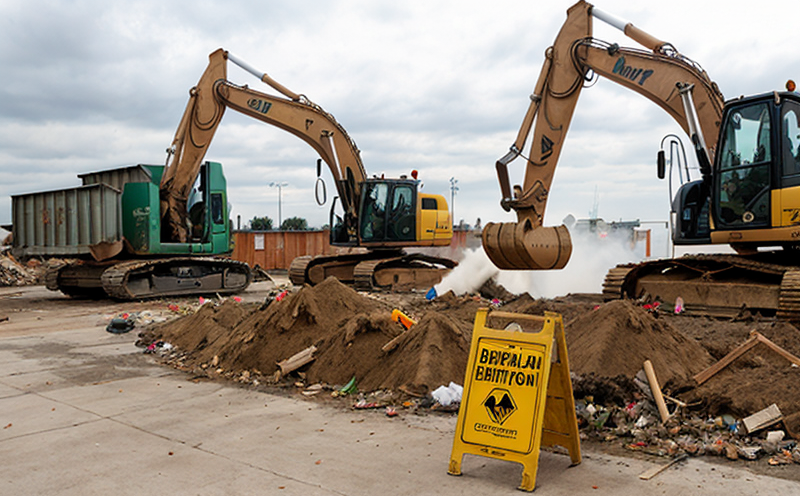EN 1367-3 Magnesium Sulfate Soundness of C&D Aggregates
The European standard EN 1367-3:2018 provides a method for determining the resistance of construction and demolition (C&D) aggregates to magnesium sulfate crystallization. This test is critical for assessing the durability of these materials in environments where they are exposed to aggressive chemical conditions, such as coastal areas or industrial settings.
The primary focus of this test involves exposing aggregate samples to a saturated solution of magnesium sulfate at 60°C for 7 days followed by drying and weighing. The percentage loss in weight after this treatment is used to evaluate the soundness of the aggregates. A higher resistance indicates better durability, which is essential for ensuring that structural components remain stable over time.
Construction and demolition waste (C&D) represents a significant portion of municipal solid waste. Properly managing this waste can lead to environmental benefits and cost savings through recycling and reuse initiatives. By testing the soundness of C&D aggregates according to EN 1367-3, stakeholders ensure that recycled materials meet stringent quality standards, thereby promoting sustainable construction practices.
The importance of this test cannot be overstated, especially in regions facing increased environmental challenges due to climate change or industrial activities. Ensuring that recycled aggregates used in new constructions and repairs withstand harsh conditions enhances the overall sustainability and longevity of infrastructure projects.
Furthermore, compliance with international standards like EN 1367-3 is crucial for regulatory adherence. Many countries have adopted these standards as part of their waste management policies to ensure that construction materials are both environmentally friendly and structurally sound.
- Sample Preparation: Aggregates must be sieved into specific fractions before testing, typically including 4 mm, 10 mm, and larger sizes. Proper preparation ensures accurate results reflecting the properties of each size class.
- Treatment Process: Samples are immersed in a saturated magnesium sulfate solution at 60°C for seven days. This duration simulates the extended exposure these materials might experience under real-world conditions.
- Weighing and Analysis: After treatment, samples are dried to constant weight before being weighed again. The percentage loss is calculated based on this difference in mass.
This method not only helps quality managers and compliance officers ensure product integrity but also aids R&D engineers in optimizing the use of recycled materials while maintaining structural performance. For procurement teams, knowing that EN 1367-3 compliant products are used ensures long-term cost-effectiveness without compromising on durability.
In summary, the EN 1367-3 test is vital for construction and demolition waste management as it provides a standardized approach to assessing the resistance of recycled aggregates against magnesium sulfate crystallization. This ensures that materials meet rigorous quality standards, supporting sustainable practices in the industry.
Eurolab Advantages
At Eurolab, we pride ourselves on delivering high-quality testing services with exceptional accuracy and reliability. Here’s how we can support your needs:
- Precision Instruments: Our state-of-the-art equipment ensures consistent and accurate results every time.
- Experienced Technicians: Our team of experts has extensive experience in conducting tests according to international standards like EN 1367-3, ensuring that you receive reliable outcomes.
- Comprehensive Reporting: We provide detailed reports with all relevant data and interpretations, helping you make informed decisions about your materials.
- Fast Turnaround Times: Our efficient processes allow for quicker turnaround times without compromising on quality.
- ISO 17025 Accreditation: Ensuring that our laboratory meets the highest international standards for competence and proficiency in testing.
We understand the importance of timely and accurate results, which is why we invest heavily in maintaining our facilities and training our personnel. By choosing Eurolab for your EN 1367-3 Magnesium Sulfate Soundness tests, you can trust that you are receiving top-tier services tailored to meet your specific requirements.
Quality and Reliability Assurance
At Eurolab, we uphold the highest standards of quality assurance in every aspect of our operations. This commitment extends to our testing procedures for EN 1367-3 Magnesium Sulfate Soundness tests.
- Regular Calibration: All instruments used are regularly calibrated against national standards to ensure accuracy and reliability.
- Standard Operating Procedures (SOPs): Our laboratory follows strict SOPs that have been validated through rigorous internal audits and external reviews.
- Continuous Training: Technicians undergo continuous training programs to stay updated with the latest methodologies and best practices in testing.
- Quality Control Checks: Each batch of tests is subjected to quality control checks before final results are reported.
We also participate in proficiency testing schemes organized by reputable bodies, ensuring that our laboratory’s performance meets or exceeds industry benchmarks. This proactive approach guarantees that you receive consistent and reliable test results every time.
Customer Impact and Satisfaction
The impact of Eurolab’s EN 1367-3 Magnesium Sulfate Soundness tests extends beyond just providing accurate data; it directly influences customer satisfaction through several key factors:
- Regulatory Compliance: By adhering to international standards, our customers ensure that their products meet all necessary regulatory requirements.
- Sustainable Practices: Our testing supports sustainable construction practices by validating the durability and integrity of recycled materials used in various projects.
- Cost Efficiency: Ensuring product quality early in the process can save significant costs associated with rework or replacement later on.
- Reputation Building: Positive outcomes from our tests contribute to building a strong reputation for both Eurolab and its clients, enhancing trust within the industry.
Our commitment to quality and reliability has earned us a reputation as a trusted partner in waste management and recycling testing. We are dedicated to helping our customers achieve their goals while contributing positively to environmental sustainability.





